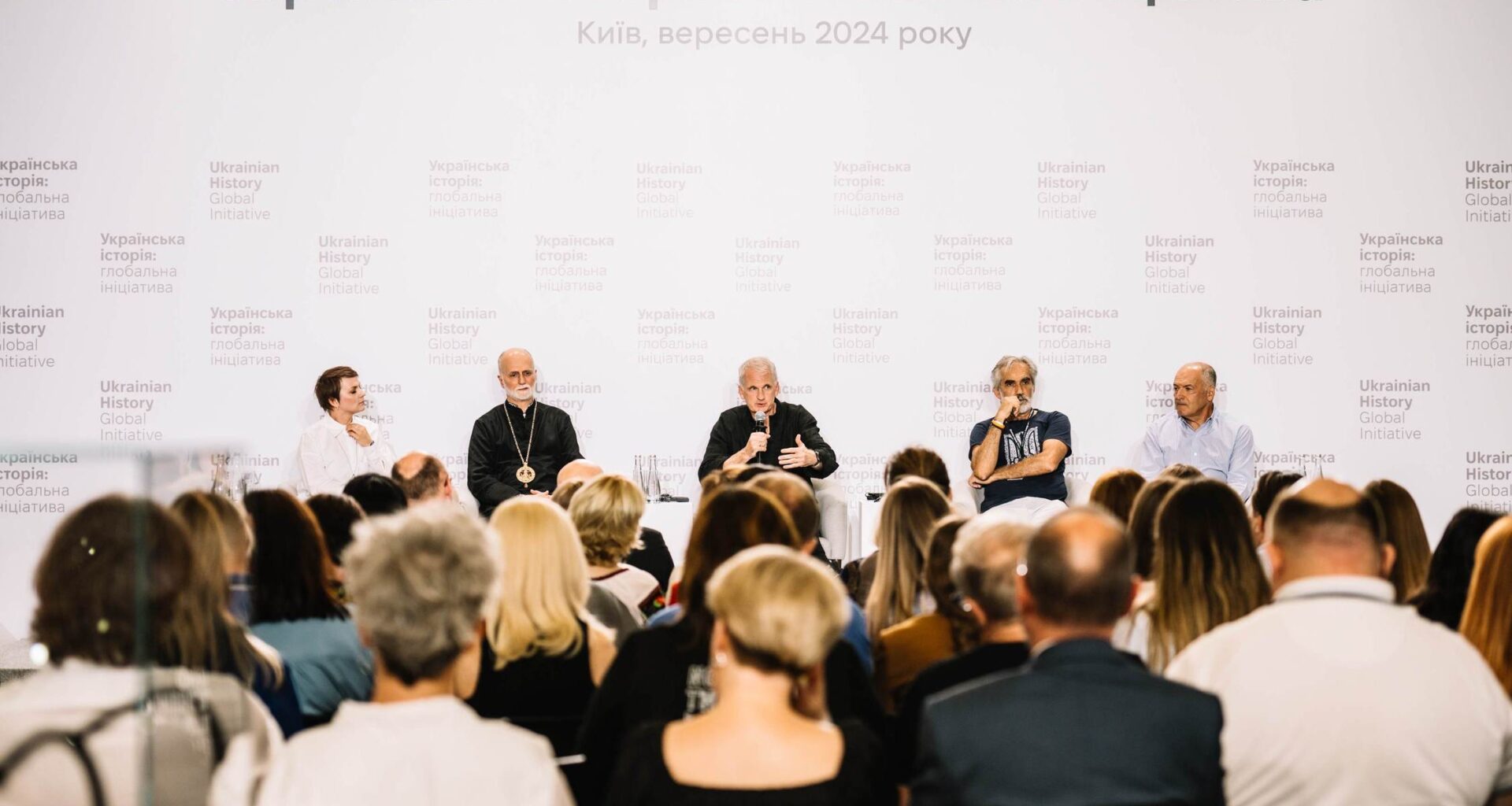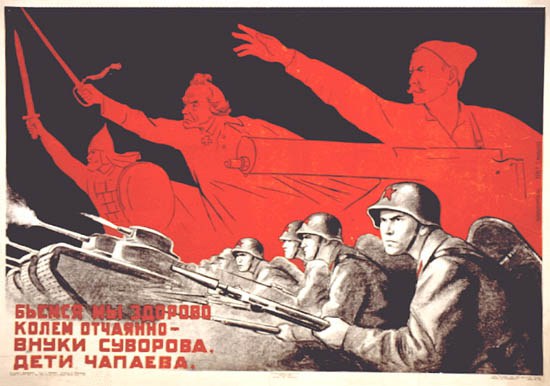Amid Russia’s ongoing invasion of Ukraine, an international coalition of historians aims to push back by creating something entirely new – a global history of Ukraine.
The brainchild of Timothy Snyder, one of Ukraine’s most prominent historical voices in the world, it is connecting scholars in Ukraine and abroad to make sense of the millennia of history of the Ukrainian lands. It will then compress three years of their work into a freely available three-million-word long online encyclopedia, a long book for scholars, and a short book for the laypeople.
“Sometimes, when things are going bad, opportunity makes you able to look in another way,” Snyder said at the presentation of the Ukraine History Global Initiative in Kyiv. It is an unprecedented, innovative project, nothing similar to what has been done in 200 years, he says: people from different countries and disciplines receive the rare chance to mingle and cooperate using innovative tools and technologies.
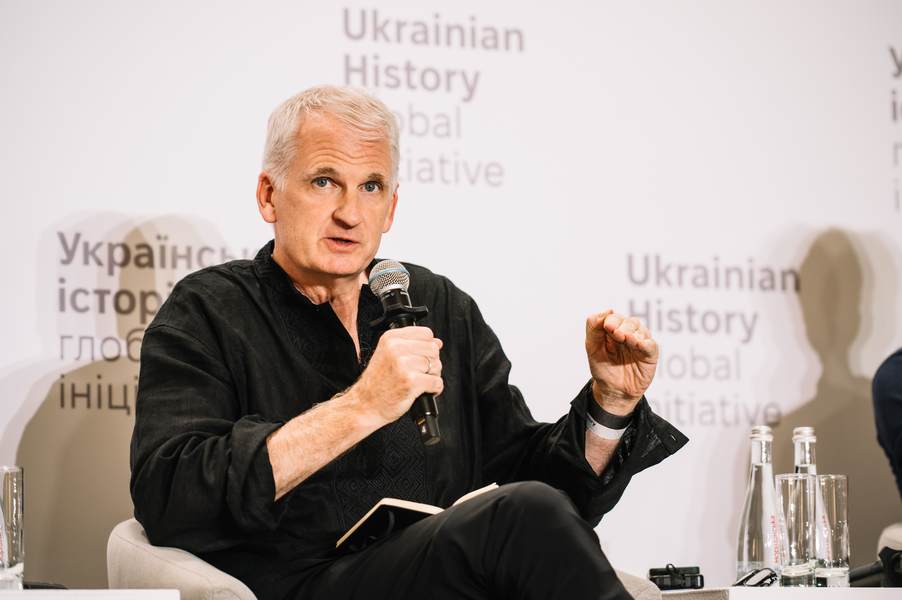
Сurrently, around 90 scholars take part. Most are Ukrainians, some 40 come from abroad. Guided by 26 members of the Advisory Board, they are divided into working groups with diverse topics spanning from the Beauty of Kyivan Rus to Society at War to Empire and Europe.
In September, many of these scholars gathered in Kyiv for a seminar that is part of the initiative: by communicating in working groups that involve a wide variety of specialists, including historians from various time groups, art scholars, archeologists, natural science scholars, political and military researchers, they attempt to forge synergies that would be otherwise impossible.
This includes journalists documenting Russian war crimes ending up in one discussion room with historians of the prehistoric age.
"The most interesting history in the world"
Timothy Snyder, a professor of history at Yale University, categorically shrugs off suggestions that this massive historical endeavor was launched to counter Putin’s distortions of history that drive the war against Ukraine.
“We do it not because of the war. We do it because I have an idea that Ukraine has the most interesting history in the world,” Snyder explains the rationale of the project:
“How bored I am in dealing with Putin’s historical myth. It’s not about Putin’s myth but about trying to do something positive. Not about confronting one myth with another myth, or confronting any myth particularly. It’s a project not only for Ukraine but modern humanities. They have suffered in the last 30 years; this is an old-fashioned attempt to revive the humanities.”
Ukrainian history is not only interesting in itself, but it helps understand other big questions about other civilizations around the world, Snyder says: “We want to answer hard questions like ‘when did humans cross into Europe,’ ‘what causes wars.’ We’re trying to genuinely answer hard questions and do it interestingly.”
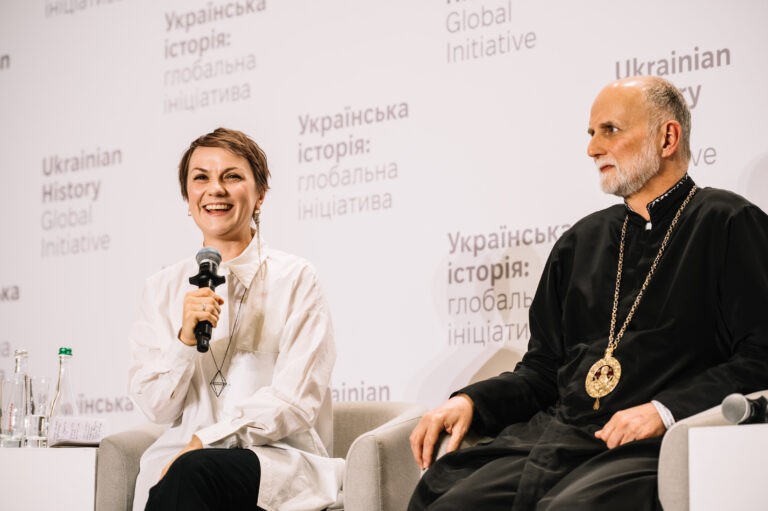
Borys Gudziak, a Metropolitan of the Ukrainian Greek Catholic Church, President of Ukrainian Catholic University, hopes that this interdisciplinary project will be able to delve into the meanings that the ancestors of Ukrainians lived by: “What were their priorities? How did they measure time, how did they look at eternity, what was life and death for them?”
While Putin’s historical distortions justifying his wars are based on narratives – for example, that the Kyivan Rus’ adoption of Christianity in Kyiv by Prince Volodymyr in 988 gives Russia a “right” to control Ukraine, or the false claim that Ukraine is “not a state” – the Ukraine History Global Initiative will not seek to counter those narratives by promoting alternative ones.
“There is no central story. It is more about the connections. We are talking about a palace with many rooms. Each scientist investigates their own, but they have a connection with each other. There are things that are not foreseen, and they build these connections. There will be a kind of palace here, with many entrances and exits,” Snyder explained.
At the presentation in Kyiv, some participants of Ukraine History Global Initiative shared what their “rooms” will be like.
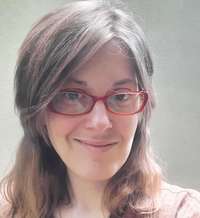
Hi! My name is Alya Shandra, I'm the author of this piece. I believe in the power of data and analysis, and that's why we try to give you the best of it at Euromaidan Press.
Become our patron to help us bring you the best insights from Ukrainian and foreign analysts so we can cut through the noise together.
Oksana Kis, a historian and anthropologist, will delve into the dimension of womanhood in Ukrainian history, to “understand the ideas about women that formed on the level of gender ideology and propaganda, what the norms and practices were, how women and men interacted, and what was the space for variations and resistance.” The history of Ukraine and women is very similar, she believes: both were invisible for history, until now.
Natalia Starchenko, a historian studying the nobles of the late middle ages and early modernity, will endeavor to uncover how the ancestors of Ukrainians used the word, not the sword, to stand by their rights, “sometimes finding allies, sometimes bluffing, sometimes demanding.” Starchenko believes that it was during this time that the nation-forming of Ukrainians began, because they started forming their ideas about the past, and viewing themselves as the “people of [Kyivan] Rus.”
Barbara Skinner, professor at the Indiana State University, will study religious history on the lands of the Polish-Lithuanian Commonwealth, and delve into the importance of religion for self-identification of its residents.
Marta Andriiovych, a historian of prehistoric times, will study how people spread across the territory of Ukraine, from early paleolithic times, how archeological cultures developed, their resilience and vulnerabilities, how they braced climate changes and used natural resources.
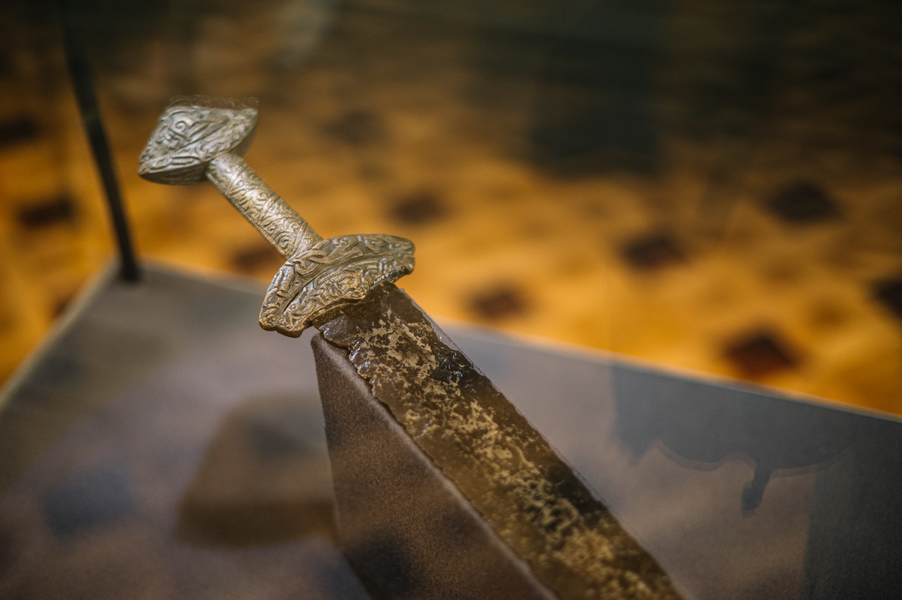
Breaking Ukraine's curse and solving the global problem of Russia
Funding the initiative is Ukrainian businessman Viktor Pinchuk, who is on the board of trustees along with Pulitzer-prize winning journalist Anne Applebaum and former Swedish Prime Minister Carl Bildt.
Pinchuk names practical reasons for bankrolling Ukraine Global History Initiative: “When we think about a Marshall plan, reconstructing Ukraine, we need to understand where we come from and who we are. We cannot move forward without understanding what kind of country we want to build,” the businessman told during the project’s presentation in Kyiv.
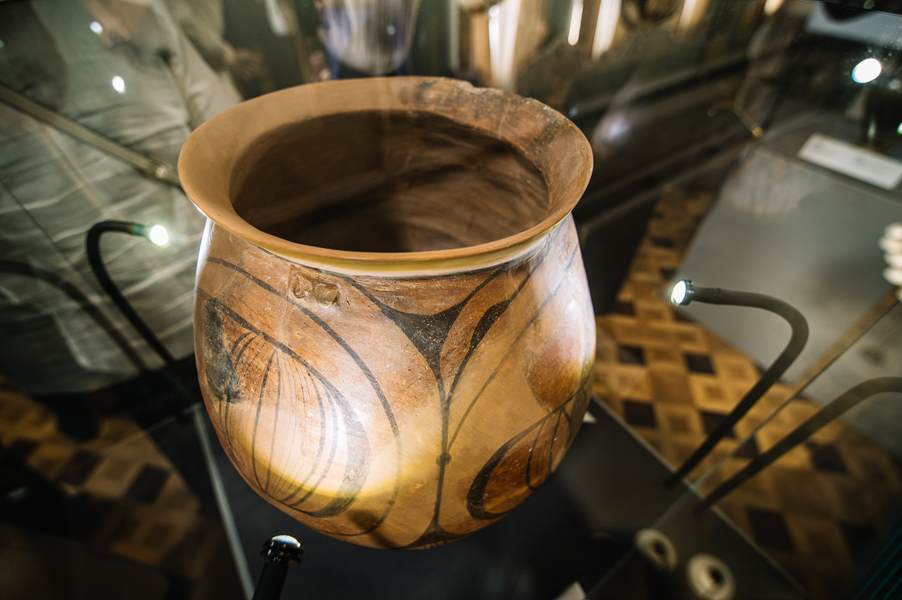
Yaroslav Hrytsak, a Ukrainian historian whose latest book is “Overcoming the past: a global history of Ukraine,” concurs. Although the Ukrainian History Global Initiative is a purely scientific project, it has a practical dimension—to help Ukraine on this path towards a better future.
The lands of Ukraine have been a war zone for millennia. The reason for this is its geographical location: the fertile, open steppes washed by the Black Sea have been a highway for migrating peoples, and have also made Ukraine into the Bloodlands of the 20th century.
While Ukraine cannot change its geography, it can make a radical step to alter this geopolitical predicament: enter the zone of the EU, which has created a territory trying to escape the two recurring topics of global history – violence and poverty.
According to Hrytsak, over 30 years of independence, the young state of Ukraine has generally succeeded in building its national identity. Otherwise, it would not be fighting for its existence for the third year, far beyond Putin’s plans to take the country in three days.
However, the challenges and problems it faces now are much higher. Solving them will require going beyond Ukraine’s national history and entering the global process “to understand where we are and what is happening with us”:
“The question is not whether there will be a Ukraine or not; obviously, there will be. The question is what this Ukraine will be like,” Hrytsak told Euromaidan Press.
“I don’t believe that any country is destined to failure,” Hrytsak comments, alluding to the notion that Ukraine’s transitional geography, resources that attract invaders, and Orthodox heritage could preclude it from achieving the prosperity of Western Europe that Max Weber associated with Protestantism. “Every country and culture have the potential to develop, just look at South and North Korea: one culture, two different countries.”
However, some countries take a longer time to arrive at success due to historical peculiarities. Knowing how to adapt their peculiarities for traveling this path can speed up the process, and history is key to achieving this understanding.
History shows that young countries undergoing wars and revolutions have propelled their nation-building, and Ukraine is a prime example, Hrytsak says. War speeds up everything: processes that usually take 30 years can be completed over three. Old regimes, such as Ukraine’s tenacious post-Soviet bureaucracy, die hard; something radical must happen for them to radically change:
“Unfortunately, the war is destroying our country, taking the lives of Ukrainians, but it also burns down the old Soviet, imperial legacy.”
Hrytsak offers a stark historical warning: wars are unavoidable. The best thing you can do is prepare. This is advice that Ukraine itself did not heed, instead nurturing illusions that a Russian attack is unthinkable. However, now that war has broken out, Ukrainians must face it not only as a threat but as an opportunity – to change their country for the better and ensure that all the sacrifices were not in vain.
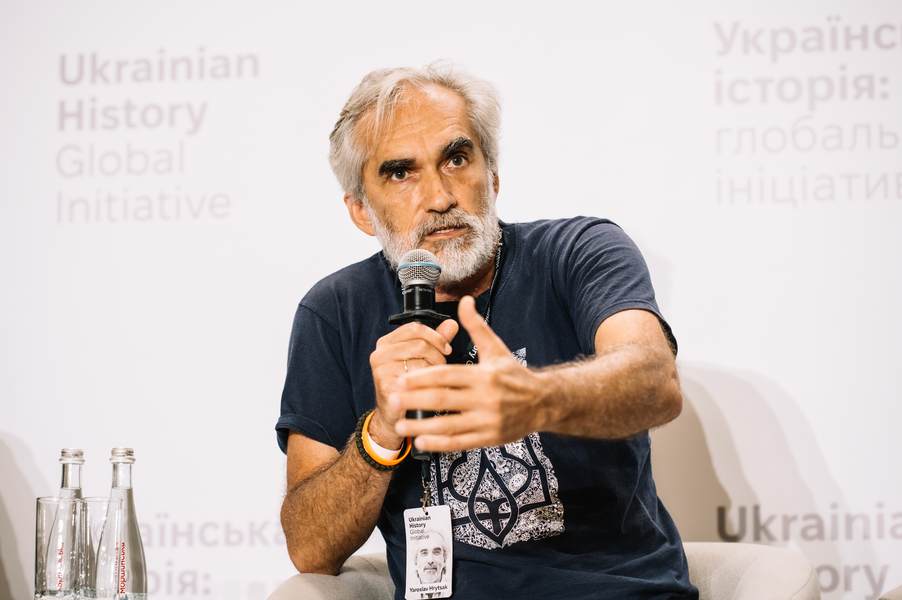
The endgoal? According to Hrytsak, it is for Ukraine to become a “boring” country, such as Sweden, or even Bulgaria – one that has a massive middle class, where there is no poverty, and is inconceivable to imagine being at war, because it is a safety zone – the EU. Ukraine’s goal is to make it inside this zone
“Returning to Europe is not only about improving Ukraine’s living standards, although there is nothing wrong with that. Returning to Europe means solving our central problem – that of security,” Hrytsak says.
“I want to live a boring life, when the most important question is who to celebrate your birthday with. This state is achievable: I am seeing Poland’s transformation over the last 20 years; many people said that Poland would not make it. But it did, and Ukraine can, and my task as a historian is to convince Ukrainians and the whole world of this.”
The EU has many advantages making it preferable for Ukraine to join. It was a Western Christian civilization formed around the idea of dignity of man as an image of God, and therefore the inviolability of property. This model was unique, although now there are attempts to replicate it. The Western civilization was also the first territory where the powers of those in power was limited, be they kings or presidents. Heads of states live by the same rules as all the citizens, Hrytsak stresses.
Europe had a long journey before achieving this state; it made mistakes along the way, but nevertheless succeeded and therefore achieved economic prosperity. This is Ukraine’s goal as well, Hrytsak says. Many reforms were conducted to achieve the goal in the 30 years of Ukraine’s independence, especially after the Euromaidan revolution of 2014, with the most important outstanding tasks being education reform and judicial reform. Then, Russia invaded.
Another way the Ukraine History Global Initiative could make a practical impact is by is helping the world solve the problem of Russia, Hrytsak believes:
“It’s at the same threat level as climate change and nuclear weapons. Russia has created immense environmental problems by its sales of oil and gas. Russia threatens the entire world with a Third World War and nuclear bomb. The Russian problem is a key problem for the world, and Ukraine is the key to solving it.”
The project can help because only by having a global perspective can one understand the importance of Ukraine, therefore raising awareness about its plight. However, Ukraine’s central role in solving Russia’s problem is “something I would never wish to anybody,” the historian adds.
Related:
- Archeological research suggests first cities of humanity were in Ukraine, not in Mesopotamia
- Ukraine seeks to reclaim history by reframing Russia as “Moscovia”
- Ukrainian history gift to global history – Prof. Snyder
- Timothy Snyder: Putin’s essay on Ukraine creates mythical history to cover foreign policy failures

